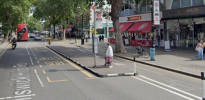E-scooters are not active travel. E-scooters are powered by electricity.
In my experience e-scooters do not get people out of cars. Instead, they replace walking and bicycle journeys (which are active travel!) with a mode which is quicker but which has a bigger carbon imprint (by dint of using electricity) than if the user had walked or cycled. And that's before we get started on the carbon embedded in the battery making process.
I think you have hit the nail on the head.
No tax, insurance, mot or any rules for e scooters. I see them on the pavement when it suits them. Going through reds etc
That is my experience too.
Cyclists can be a surprise as well. My latest surprise was as I walked across a zebra crossing when all of a sudden a bicycle came hurtling towards me. I tried to jump sideways. I think the cyclist had come off the pavement to cross the road in the opposite direction to me so was just too fast. But perhaps had turned right around the car waiting for me to cross. There are a proportion of cyclists and e-scooter riders who flit between road and pavement as it suits them. That is not a majority but is a growing umber. I would like to see them having a better understanding - training. Furthermore it would not hurt if car (and HGV etc) drivers had to take a more regular test.
20 years ago it was decided that bus lay-bys be removed, similar comments to the above were made. In reality the buses soon caught up with the traffic in front of them, so overall the impact was small.
The cost of roads is primarily down to catering for motor vehicles.
For example, when designing a road the lifespan of the structure (i.e. not the top 40mm) of the road is set by the number of HGV and buses which use it. Other than surface replacement a road with no HGV movements could (in theory) last indefinitely.
The reality would be that nature would reclaim the road over time.
However there point is that if there were no cars the cost to society wouldn't be an issue.
There is a bus lay-by near me that has been removed. Now all the other traffic has to wait behind the bus. It must be a bit more polluted there than it used to be.
Most of the road damage must be done by HGVs and buses. I have been puzzling the state of the road surface at bus stops where there are huge ruts and bulges. Maybe the axle-load of buses is enormous when buses start and stop. Granted I have noticed that buses along with other vehicles are driven a lot less aggressively outside London.
The surface damage in the form of pot holes is mainly done by freezing weather. That damage would not reduce much with less cars BUT the means to pay for the repairs would reduce with less cars. Having encountered poor road surfaces whilst riding a bike I would be very keen for the surface to be repaired regardless of how many cars use the road.
There is an argument that repairs to roads in cities generally comes from council budgets so not central government. But the road fund licence / "road tax" still indirectly pays for those roads. If the income from "road tax" is reduced then some other way to pay for things has to be found.
I'm up for a special category, but on the other hand I'm anxious that we seem to see these are more analogous to a car, than a pushbike.
In nottingham we had our programme ran by a German company, Wind. The impression that I got is that they agreed with the Council to certain things (speed limits, geofencing) with the expectation of allowing pavement riding in return; and unfortunately the council was not forthcoming.
My view over the years is that although riding a bike on the pavement is frowned upon a cyclist may feel safer doing that. But I would only ask that they ride at a slower speed thus not intimidating the pedestrians. Ideally cyclists should feel safe on the roads (excepting motorways and similar). Since e-scooters are generally faster I think there have to be more rules for them and I do find them rather surprising when I encounter one on pavements.
At the end of the day this should not be seen as car drivers vs e-scooters vs cyclists vs pedestrians. The problem is human beings and the proportion of them that are not considerate or are ignorant. The other problem is how we are ruining the planet - again lack of consideration and/or ignorance. Training for the users is one thing BUT this ignorance extends to planning out of town shopping and other activities (like gyms !) which really only encourages car use.
How many gym users drive to their gym ?. I walk instead and then do not feel the need to actually pay for a gym. Simple solution.

